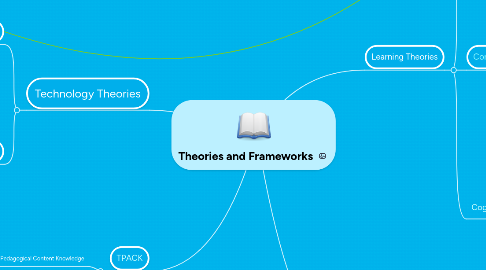
1. Learning Theories
1.1. Connectivism
1.1.1. Learners go through a process of creating connections and developing a network
1.1.1.1. This network can provide resources, and support that can expand the horizons of a students' education.
1.1.2. Learning is active: Knowing where to find information is more important than knowing information
1.1.2.1. Therefore, the student can better find and access more knowledge. Knowledge is at a students' Fingertips.
1.1.3. Emphasizes that knowledge is actively constructed by learners
1.1.3.1. Therefore, the student can better find and access more knowledge.
1.1.4. Teachers provide support and help students foster connections with knowledge
1.1.4.1. Students make connections through many online tools and resources, such as blogs. It expands the horizons of a student's education.
1.2. Constructivism
1.2.1. Learners build new knowledge upon the foundation of previous learning
1.2.1.1. The structure of our Education System supports this point. Students K-12 are constantly building on their learning from the prior grade level. Students do not move through grades with a blank slate.
1.2.2. Learning is active: Learners confront understanding in new learning situations. Learners' understanding can change to accommodate new learning
1.2.2.1. Ie. A student may be unfamiliar with a wolf and identify the animal as a dog. However, soon learn of their differences and accommodate their prior understanding.
1.2.3. Emphasizes authentic, challenging projects that include students, teachers, and experts in the learning community
1.2.3.1. This fosters collaboration where individuals can express their perspectives and work through a shared understanding.
1.2.4. Teacher guides and facilitates rather than lecture
1.2.4.1. Students bring their own experiences to learning.
1.2.5. Has roots in philosophy, psychology, sociology, and education
1.2.5.1. The very fact that it has roots in education means it has strong implication to education and learning today.
1.3. Cognitive Load
1.3.1. Learners can process only so much new information at one time
1.3.1.1. Students remember way of thinking through rules, patterns, and strategies.
1.3.2. Demands an understanding of memory - working memory and long-term memory
1.3.2.1. Working memory is used to take in information and then moved to long term memory for storage (long term knowledge).
1.3.3. Learning is mental processes of how to think, perceive, remember and learn knowledges
1.3.4. Teachers need to be conscious of how much information they are presenting to their students at a time
1.3.4.1. This is because information overload impairs a student's learning.
2. Technology Theories
2.1. SCOT
2.1.1. Social Construction of Theory
2.1.1.1. Put simply, human drive technology; how technology is affected and is shaped by humans
2.1.1.2. Idea that technology and techniques, modes of information and codes of communication play a leading role in human affairs
2.1.1.3. Technology does not determine human action
2.1.1.4. Not only a theory, but a methodology - formalizes the process of analyzing the causes of technological failures or successes
2.2. Media Ecology
2.2.1. Put simply, technology drives humans; how humans are affected by technology
2.2.2. The study of media as environments
2.2.2.1. Media is not an object, not an institution or organization, as an environment.
2.2.3. There are various definitions and opinions of what media ecology embodies
2.2.4. Looks at the influence of technology on society - feelings and perceptions
3. TPACK
3.1. Technological Pedagogical Content Knowledge
3.1.1. Interplay/combination of Content, Pedagogy, and Technology Knowledge. A successful learning environment will aim incorporate all three of these domains.
3.1.1.1. CK: Content Knowledge
3.1.1.1.1. The subject or concepts being taught
3.1.1.2. PK: Pedagogical Knowledge
3.1.1.2.1. Refers to the way of teaching, conveying the content
3.1.1.3. TK: Technology Knowledge
3.1.1.3.1. Ability to use technology - computer, software, online tools, and various other means
